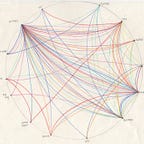Back to School, Pandemic Year 2
“First day back in the classroom in a year! Wish me luck!😬”
“Have a great and safe semester everyone!”
“Can’t believe it’s been over a year.”
I’m looking around at teacher friends, peers, colleagues, acquaintances as the new school year is beginning, and it seems like there’s a hesitant joy about going back to college. Students are returning in person on many campuses; though all the campuses I’m familiar with (I live in New York, and my networks are decidedly distributed among the science-friendly regions of the country) are requiring masks during all classes.
I’m a little surprised there’s as much cheer as there is, among people who a year ago were adamantly fighting corporatized administrations which were trying to force a school year to happen. The compromise we all reached was probably as bad — a year of online learning, where screen fatigue and isolation combined to make education into a punishment. The students parted with their money, the teachers suffered through circumstances wherein teaching was essentially impossible, and the institutions maintained their ‘economic normalcy’ at the expense of everyone involved.
This year, it feels like the faculties have succumbed to their fatigue. The virus, sadly, has gone nowhere. In spite of vaccinations, the virus has had ample time to spawn variants and continues to decimate healthcare systems, communities, and families on a global scale. And yet even the most vocal of last years’ academic dissidents are posting online about the reluctant cheer they feel as they re-enter classrooms full of masked students.
In my case, I have been assigned a remote-only course at the prestigious art school where I am a marginal ‘adjunct’ faculty member. I consider it an equal farce to last years ‘zoom pedagogies’ or this year’s in-person, indoor immune-system pressure tests. As if, in the trials of last year, we all somehow became alchemists, transforming alienating, glitchy zoom classes into genuine, engaging human interactions.
Now, I am always happy to meet learners online and hold conversations and support their thinking (I do it as a hobby and as a central part of my own creative practice), but I can’t get behind the idea that this is their higher education. Worse, that the institution collects tuition from them for it. True, I’m not teaching a subject (artistic practice) where I can just post PowerPoint presentations and insist on rote learning — this educational crisis is much more acute in the arts, and possibly the humanities or other embodied and affective learning spaces.
Last year, it felt like the pandemic had finally thrown into clear relief the stark realities of our feudal capitalism — that it is unsupportable from both a social and ecological standpoint. And that there was now perhaps an appetite and an opportunity to say: we could just cancel the school year, we could just stop going to work, we could act collectively in the collective interest, and ensure that we are fed, housed, entertained, and given the opportunity for larger purpose simply by virtue of being human beings. It felt like we had finally decoupled our human worth from our economic worth, and recognized the need to prioritize the human.
This year, it feels like economic thinking has crept back, and not only among the typical capitalist classes, but among the ‘progressive’ and educated. It feels increasingly an isolated view that we shouldn’t be trying so hard to get back to ‘normal.’ It’s as if we’ve been holed up for over a year, watching our politicians utterly fail their historic moment, and reaching the limits of exhaustion by having to be our own leaders from household to household, community to community. All the while those old addictions have been whispering in our ear: money, ‘productivity,’ consumption.
Colleges are applying pressure on that ingrained, reflexive addiction to moneythink: students’ need to spend it, teachers’ need to ‘earn’ it, institutions’ need to collect it. Of course, the presence of money in the equation skews our ability to make collectively beneficial choices. The individualism of personal finance is once more eclipsing the collective awareness that we achieved when we fully understood the meaning of public health (if anyone is sick, we are all sick).
It feels as if the planet is screaming at us — through fires and storms and heat and yes, deadly mutating microorganisms — that the way things had been must come to an end and a new collectivism is required. That’s why it’s so disconcerting this Fall to see even so many scholars, teachers, and generally very smart people seeming to go willingly back to the way things (kind of) were.
